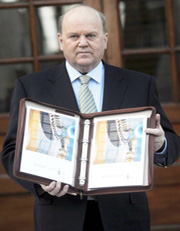
Minister for Finance Michael Noonan has described the property market as “an essential ingredient of future growth”.
Defending his decision to put incentives in this week’s Budget aimed at kick-starting the property market again, Minister Noonan admitted that the decline in the industry was having a damaging effect on the economy as a whole.
He said the poor state of the property market was having “a huge psychological effect in Ireland”. As a result, property owners were more inclined “to save rather than to spend and invest”, and that was why Ireland’s savings ratios were so high.
“Everybody has a rainy-day mentality and they are putting money away. So I am trying to break that,” Mr Noonan said.
First of all, he said he was providing incentives on commercial property. US investors had told him of the “astronomical amounts of money” they were ready to spend on property but they “lacked certainty”.
He would reduce commercial stamp duty to 1 per cent, the same level as in London. In addition, anyone who bought commercial property before the end of 2013 and held it for at least seven years would not be subject to capital gains tax.
“I want them to come in, buy, invest and stay for at least seven years,” the Minister said.
On the residential side, his predecessor, the late Brian Lenihan, had announced previously there would be no mortgage relief on any house bought from January 1st, 2013. “I don’t think there is an awareness of that out there, especially among the young couples who have saved a lot of money,” he said.
He was now offering them a combination of “stick and carrot”. The stick was that they would get no mortgage interest relief if they deferred their purchase to January 2013. “The carrot is, that I am increasing the level of mortgage interest relief that you will get if you buy in 2012,” he said.
He did not know if his property package of low-cost measures would work or not: “But I am certainly not going to sit back.”
Asked if he was in danger of creating another property bubble, he said: “All modern developed economies have a thriving construction and development sector.”
He warned: “There is a danger here that if we scapegoat the property sector, an essential ingredient of future growth gets no attention.”





